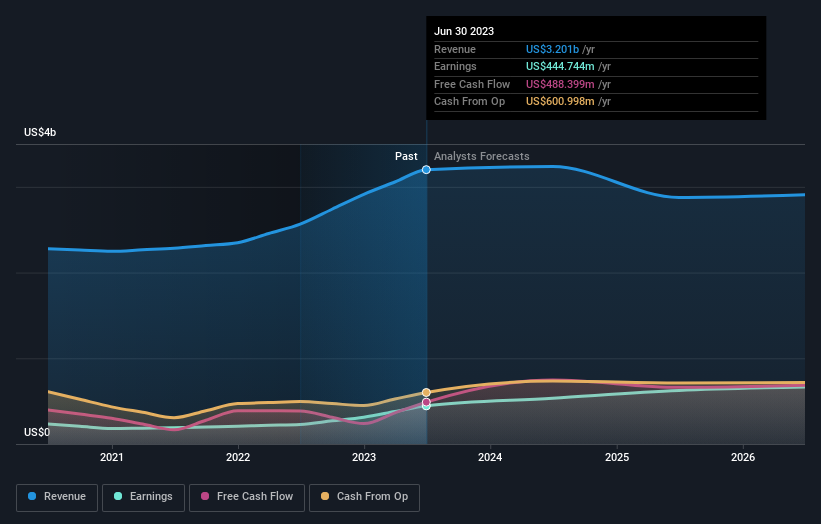Institutional investors may adopt severe steps after Computershare Limited's (ASX:CPU) latest 7.4% drop adds to a year losses
Key Insights
Institutions' substantial holdings in Computershare implies that they have significant influence over the company's share price
A total of 25 investors have a majority stake in the company with 48% ownership
If you want to know who really controls Computershare Limited (ASX:CPU), then you'll have to look at the makeup of its share registry. The group holding the most number of shares in the company, around 48% to be precise, is institutions. In other words, the group stands to gain the most (or lose the most) from their investment into the company.
And institutional investors saw their holdings value drop by 7.4% last week. The recent loss, which adds to a one-year loss of 15% for stockholders, may not sit well with this group of investors. Also referred to as "smart money", institutions have a lot of sway over how a stock's price moves. As a result, if the downtrend continues, institutions may face pressures to sell Computershare, which might have negative implications on individual investors.
Let's delve deeper into each type of owner of Computershare, beginning with the chart below.
See our latest analysis for Computershare
What Does The Institutional Ownership Tell Us About Computershare?
Institutions typically measure themselves against a benchmark when reporting to their own investors, so they often become more enthusiastic about a stock once it's included in a major index. We would expect most companies to have some institutions on the register, especially if they are growing.
As you can see, institutional investors have a fair amount of stake in Computershare. This can indicate that the company has a certain degree of credibility in the investment community. However, it is best to be wary of relying on the supposed validation that comes with institutional investors. They too, get it wrong sometimes. If multiple institutions change their view on a stock at the same time, you could see the share price drop fast. It's therefore worth looking at Computershare's earnings history below. Of course, the future is what really matters.
Hedge funds don't have many shares in Computershare. The company's largest shareholder is Australian Super Pty Ltd, with ownership of 11%. In comparison, the second and third largest shareholders hold about 6.2% and 6.1% of the stock.
A deeper look at our ownership data shows that the top 25 shareholders collectively hold less than half of the register, suggesting a large group of small holders where no single shareholder has a majority.
Researching institutional ownership is a good way to gauge and filter a stock's expected performance. The same can be achieved by studying analyst sentiments. There are plenty of analysts covering the stock, so it might be worth seeing what they are forecasting, too.
Insider Ownership Of Computershare
The definition of company insiders can be subjective and does vary between jurisdictions. Our data reflects individual insiders, capturing board members at the very least. Management ultimately answers to the board. However, it is not uncommon for managers to be executive board members, especially if they are a founder or the CEO.
Most consider insider ownership a positive because it can indicate the board is well aligned with other shareholders. However, on some occasions too much power is concentrated within this group.
Shareholders would probably be interested to learn that insiders own shares in Computershare Limited. It is a very large company, and board members collectively own AU$574m worth of shares (at current prices). we sometimes take an interest in whether they have been buying or selling.
General Public Ownership
With a 47% ownership, the general public, mostly comprising of individual investors, have some degree of sway over Computershare. While this size of ownership may not be enough to sway a policy decision in their favour, they can still make a collective impact on company policies.
Next Steps:
It's always worth thinking about the different groups who own shares in a company. But to understand Computershare better, we need to consider many other factors. To that end, you should be aware of the 2 warning signs we've spotted with Computershare .
If you are like me, you may want to think about whether this company will grow or shrink. Luckily, you can check this free report showing analyst forecasts for its future.
NB: Figures in this article are calculated using data from the last twelve months, which refer to the 12-month period ending on the last date of the month the financial statement is dated. This may not be consistent with full year annual report figures.
Have feedback on this article? Concerned about the content? Get in touch with us directly. Alternatively, email editorial-team (at) simplywallst.com.
This article by Simply Wall St is general in nature. We provide commentary based on historical data and analyst forecasts only using an unbiased methodology and our articles are not intended to be financial advice. It does not constitute a recommendation to buy or sell any stock, and does not take account of your objectives, or your financial situation. We aim to bring you long-term focused analysis driven by fundamental data. Note that our analysis may not factor in the latest price-sensitive company announcements or qualitative material. Simply Wall St has no position in any stocks mentioned.


